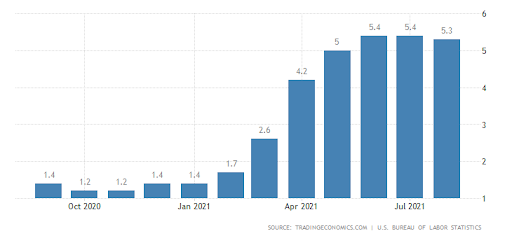The Federal Reserve held a two-day meeting on Tuesday, September 21, to discuss the job market, rising inflation, and its policy response. Given the current bout of inflation, the market closely watched the meeting to predict when the central bank will taper its bond purchases and increase interest rates to combat inflation.
Let’s look at the origins of the Federal Reserve’s bond-buying program and when the central bank may start to taper off purchases.
Don’t forget to check our Fixed Income Channel to learn more about generating income in the current market conditions.
Bond Buying & Inflation
The Federal Reserve began buying $80 billion per month of Treasuries and $40 billion per month of mortgage-backed securities to provide liquidity during the COVID-19 pandemic. While the economy swiftly rebounded from the crisis, the central bank is only beginning to contemplate how to taper off its bond-buying activities.
Inflation has been on the rise in the U.S. over the past few months, reaching 5.4% in July. With global supply chain disruptions, many experts attributed inflation to scarcity. The problem is that inflation is starting to appear in new parts of the economy, including shelter, food, energy, and medical services—all core consumer categories.

Inflation is on the rise. Source: TradingEconomics
Before the Fed’s June meeting, the market assumed that the central bank would let interest rates remain above its 2% target for an extended period, but most officials said that they expect rates to rise at least a half percentage point in 2023. CNBC’s Fed Survey now predicts that tapering will begin in December with a rate hike in late 2022.
During the meeting last week, Federal Reserve Chairman Powell said that the central bank could begin scaling back asset purchases in November and complete the process by mid-2022, as a growing number of officials sought to raise interest rates next year. In particular, he said that the economy is one “decent” monthly jobs report short of meeting the threshold for tapering.
Hedging Your Portfolio
The Federal Reserve’s bond-buying program has a significant impact on the financial markets. As a critical driver of demand, any decrease in bond purchases could lower their prices, assuming stable supply. The good news is that these purchases are only a fraction of total bond-buying, and demand for Treasuries and MBS remains robust.
That said, investors should prepare for the prospect of higher interest rates and less monetary stimulus to drive growth. Even if the Fed doesn’t raise interest rates, tapering could reduce demand and increase yields. Moreover, expectations for a sooner-than-expected increase in interest rates could also lead yields to rise in anticipation of a rate hike.
There are several ways to hedge against inflation:
- International Assets: Investors may want to consider diversifying into global economies that aren’t correlated with the U.S. For example, Australia and South Korea have a lower correlation.
- Real Estate: Real estate offers a hedge against inflation since rents tend to increase along with inflation. In addition, REITs and other real estate investments also tend to pay higher yields than bonds.
- TIPS: Treasury inflation-protected securities, or TIPS, increase in value to keep up with inflation. They’re linked to the Consumer Price Index (CPI) and provide a valuable hedge.
While gold is a common inflation hedge, many experts feel that this is the best for long-term trends rather than short-term benefits. Cryptocurrencies could also be another hedging option, however they come with greater volatility than conventional assets and may not be appropriate in retirement portfolios or other places where low-risk investments are required.
Be sure to check out our Portfolio Management Channel to learn more about building or rebalancing your portfolio.
The Bottom Line
The Federal Reserve announced its plans to taper bond-buying during its meeting last week and will likely begin the process in November. As a result, investors may want to hedge their portfolios sooner rather than later.
Want to generate high income without undertaking too much risk? Check out our complete list of Best High Yield Stocks.





